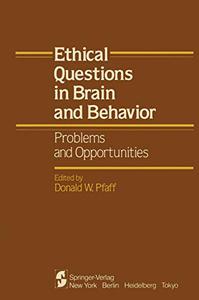
Ethical Questions in Brain and Behavior: Problems and Opportunities by Donald W. Pfaff
English | PDF | 1983 | 161 Pages | ISBN : 1461255929 | 3.7 MB
Webster's dictionary defines ethics as "a group of moral principles or set of values ... governing the behavior of an individual or a profession." A moment's reflection reminds one that the definition cames inherent anthropological limits: Most ethical principles represent tribal rules, not guidelines universally deduced by the species as being to their advantage. By no means can we prove that Fiji Islanders necessarily agree with Kant's categorical imperatives. Furthermore, even within our Western tribes, subcultures differ vigorously in some aspects of their ethics. Witness the divisions that separate the principles of the Moral Majority from what many academics believe.
Webster's dictionary defines ethics as "a group of moral principles or set of values ... governing the behavior of an individual or a profession." A moment's reflection reminds one that the definition cames inherent anthropological limits: Most ethical principles represent tribal rules, not guidelines universally deduced by the species as being to their advantage. By no means can we prove that Fiji Islanders necessarily agree with Kant's categorical imperatives. Furthermore, even within our Western tribes, subcultures differ vigorously in some aspects of their ethics. Witness the divisions that separate the principles of the Moral Majority from what many academics believe.
What is it then that stimulates the discussions summarized in this book? Certainly it is not any confidence in a zealously held set of ethics that any of the authors wish to impose on others. Rather, my own reasons (F.P.) lie in the fact that one can hardly be a doctor without subjecting oneself to a good deal of questioning about one's own and one's associates' behavioral principles. As a result, as Paul Ramsey well states: "The Nuremberg Code, the Declaration of Helsinki, various 'guidelines' of the American Medical Association and other codes governing medical practice constitute a sort of catechism in the ethics of the medical profession. These codes exhibit a professional ethics which ministers and theologians and members of other professions can only profoundly respect and admire." Nevertheless, as Ramsey goes on to point out, a catechism has never alone sufficed to guide behavior. Unless these established ethical principles are constantly pondered and enlivened in their application, they become dead letters. Furthermore, there is the need to deepen our principles, to sensitize and open to further humane revision in the face of all the ordinary and newly emerging situations which a doctor confronts. In this task, no sources of moral insight, no articulate understandings of the humanity of man or for answering questions of the medical management of life and death can rightfully be neglected.
Download From UploadCloud
https://www.uploadcloud.pro/btykklsb3o7p/rxf80.E.Q.i.B.a.B.P.a.O.rar.html
Download From NovaFile
https://nfile.cc/KQ1x35Ej/rxf80.E.Q.i.B.a.B.P.a.O.rar

https://rapidgator.net/file/f58c6c98d6797533d180f582b7d6d30d/rxf80.E.Q.i.B.a.B.P.a.O.rar.html

https://nitroflare.com/view/0FC21928C6F1255/rxf80.E.Q.i.B.a.B.P.a.O.rar

https://uploadgig.com/file/download/8c7b3fB2977b92cb/rxf80.E.Q.i.B.a.B.P.a.O.rar
https://www.uploadcloud.pro/btykklsb3o7p/rxf80.E.Q.i.B.a.B.P.a.O.rar.html
Download From NovaFile
https://nfile.cc/KQ1x35Ej/rxf80.E.Q.i.B.a.B.P.a.O.rar

https://rapidgator.net/file/f58c6c98d6797533d180f582b7d6d30d/rxf80.E.Q.i.B.a.B.P.a.O.rar.html

https://nitroflare.com/view/0FC21928C6F1255/rxf80.E.Q.i.B.a.B.P.a.O.rar

https://uploadgig.com/file/download/8c7b3fB2977b92cb/rxf80.E.Q.i.B.a.B.P.a.O.rar
Links are Interchangeable - No Password - Single Extraction
